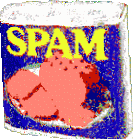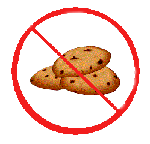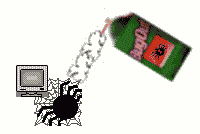

Introduction
The Web Is Like A Library
Search Engines: The Card Catalogs Of The Internet
What The Web Can - And Can't - Do For You
Tips For Increasing Website Traffic
Problems And Pitfalls Of Web Site Design
The Big Mistakes: Or, What's Up With The Dancing
Chicken?
Spam Traps: Road Hazards on The Information
Highway
Safe Surfing: Don't Take Cookies From Strangers
Safer Web Surfing Checklist
More Tips On Staying Spam-Free
Spider Squishing: Defending Your Website Against
Pesky Crawlers
Email HTML Defense Demo
Really Useful Search Engines
Word of Web: The Value Of Links
Where To Go From Here? Website Building Resources
Free Web Space Providers
Despite wild claims from marketers who'd love to take your money in return for getting your restaurant on the much-touted World Wide Web, you should do some serious thinking before you buy. Take marketing claims with more than a few grains of fleur de sel, and do some objective reading and research first to learn what a web site can and can't do for your business. The Internet is a powerful tool, but it is not likely to be a "magic bullet" for your business.
With web site design, as with any other service, you should understand exactly what it is you're getting before you buy. For starters, you should know that there are a number of sites which offer free web space. If you can put up with some of their limitations, they can be a viable alternative for a small business owner who is willing to do his or her own site building and maintenance. Some of the typical limitations and problems with free web sites are:
A page that is featured prominently near one of the "front entrances" of
the library that many people walk in through is likely to get plenty of
exposure. However, a page put down at random on the shelves of this
incredibly massive library may never be seen at all, ever, by anyone, if
it is not properly indexed and filed by the "card catalogs" and the
"librarians" of cyberspace.
For instance, if you would like to find a web page on the topic of Native
American recipes, you can head to a search engine such as Yahoo, Lycos,
Infoseek or AltaVista and type in your search parameters. These can be
simple or complex. For instance, +(native.american OR Indian) +recipes
-India -curry will yield you some likely results and eliminate some of the
items you don't want. For narrower results, "native american recipe"
might work just as well. Check the syntax of the particular engine you
are using, as they vary somewhat in their ifs, ands, ors and buts. What
all search engines have in common is that you must ask them for web
pages that meet your criteria, and they will deliver them to you.
It's important to understand that you do have to ask before you get any
information delivered to your screen at all. If you (or your customer)
does not know how to ask for your web page, or it isn't prominently linked
to an already popular site, he or she isn't likely to stumble on it by
accident. Your website's popularity depends on
its being presented to people who ask for the kind of information that is
on your site.
So what can a Web site do for you, if it isn't quite the instant road to
riches that the salesman promised? Think of it as a convenient way to
conserve paid ad space in regular, "push" oriented media such as
magazines, newspapers or radio. Anyone who has your URL (and a computer,
and a modem, and a good browser) can choose to pull up a great deal more
information than you can afford to deliver in a paid ad. The trick is in
getting them to make that choice to access it.
You can advertise your web page URL in a regular magazine or newspaper ad.
Your customers who see the ad can then print out an easy map of driving
directions to your restaurant, gaze hungrily at attractive photos of your
restaurant and your signature dishes and read your full menu listings and
entertainment schedules. You can include other fun extras, such as
clicking on menu items to get a mouthwatering photo of the dish being
described. You can link to other food sites with reviews of your
restaurant (hopefully positive), or to recipes for your popular dishes, or
interviews with the chef.
Think of your web page as an advertising brochure that doesn't cost you
anything for printing, because people can access it at home. The trick is
getting them to access it. It is not an automatic process. Even if you
do submit your page to the major search engines, keep in mind that
thousands and thousands of other people with pages similar to yours are
doing the same thing, and someone typing in a query about Cajun
restaurants in Los Angeles is likely to get a page or more of listings of
other people's web sites before yours even hits their screen. Your
restaurant's page might not even make the top fifty, even though there
might not be fifty Los Angeles Cajun restaurants. The reason for this is
the complex way that search engines use key words and coded HTML tags to
determine rankings.
No, this method is not fair, especially when a lot of unscrupulous page
owners use techniques like "salting" a page with a great number of hidden
words in order to get them to show up on many totally unrelated searches.
Fortunately, search engines are getting smarter every day, and many of
them have learned to recognize "salting" and bogus keyword repetition
techniques. The subject of how to get your site ranked more highly on
search engines is a highly complex one, and worthy of some additional
reading and research. A few tips follow.
You could design a frames-only, graphics heavy site that has moving
animation, live video feed from a webcam to the kitchen, QuickTime movies
of the chef in action, dancing carrots and chickens, glorious MIDI sound
and music and a culinary search engine with a hundred web ring foodie
links.
Bells and whistles on the Web are very large and very impressive and can
do lots of nifty things. Having a lot of interesting links can be very
useful and educational. Except that these things can actually be
detrimental to a commercial web site aimed at the general market of
restaurant-goers.
Only the most dedicated foodie is going to hang around for more than
fifteen seconds to let your home page load, and only a dedicated graphics
geek is going to have or download the esoteric extra software plugins
necessary to actually see or hear your complicated chorus of dancing
chickens. Don't make this mistake - keep your website attractive and
even interactive, but simple enough to be accessible to people with older
computers and browsers who don't have a T1 line or the latest graphical
interfaces. That's going to be the majority of your market.
A good rule of thumb concerning links on your page is to ask yourself
whether or not the average person surfing outwards from your site is
likely to come back and look at the rest of what you have to present, or
whether you have just distracted them right off your site for good. If
your site is content-heavy enough that you're willing to bet they'll come
back, it's probably safe to offer as many links as you have room for. If
you have reciprocal links, these can also make it easy for your would-be
customer to return. But if your page is simple and boring, and you direct
readers to a professionally slick site like Bon Appetit Online, the
chances of their ever coming back are slim to none.
There are HTML tools that can help with this particular issue by directing
a browser to open a second window to view the linked site, without ever
leaving your site in the original window. Some people serve the contents
of other sites in frames from their own site, but this is often considered
an annoying or even unethical practice. Study the issues involved, learn
the code, and make your own decisions on how to handle the issues of
bells,
whistles and links.
There are a lot of sites, some of them free, some of them quite expensive,
that claim to submit your URL to "hundreds of search engines" or more
honestly, to hundreds of "link pages". What they won't tell you,
especially before they take your money or your email address or both, is
that the vast majority of these sites (all but perhaps twenty) are either
completely worthless to you or exist only for the purpose of harvesting
your email address and personal statistics to sell for commercial uses.
These sites are called "spam traps", and they are pure cyberspace poison.
Once your email address is in the hands of a spamtrap site, you can expect
to recieve mass amounts of junk mail for years to come. This is truly the
gift that keeps on giving, since spammers continue to make money off of
you by selling your email address and any other information they have
about you to as many junk mail businesses as they
can.
In cyberspace, just as in real life, cookies aren't
always good for you. Some of them can be delicious and even nutritious,
but there are some pretty bad cookies out there that can cause you serious
tummy upset or worse. I'm not talking about pastry here, but about a way
you effectively give permission to a web site to write code and execute
commands on your personal computer.
These intrusive bits of code on your hard drive can do some very invasive
and annoying things, including collecting data on you that marketing
companies will pay to have. Some truly evil cookies can operate your
phone (if it's hooked up to the modem) in your absence, do destructive
things to your operating system, or collect your friend's email addresses
or even more personal data that you store on your machine.
While everyone knows that you shouldn't surf "hacker sites" lest you
accidentally download a virus, not enough people are properly wary of the
fact that sleazy adults are quite as capable of intruding onto your
computer as vandalistic teenagers. And instead of playfulness or random
destruction, they have a very purposeful intent and motive - to collect
valuable private information about you that is worth real money, hard cash
to companies that buy and sell direct marketing leads. You can find
additional information about some of the threats to consumer privacy on
the Net at the American Marketing
Association web page.
Stay away from spamtrap sites, and do not ever for any reason give a
marketing or promoting site your real email address. The chances are too
good that it will end up on a spammer's junk mail list. If a site
looks a little too slick, like a cyberspace version of a telemarketer's
phone scam, and offers you too much for free, this is a potential
tip-off that they may be making their profits in a way that isn't
immediately visible. Use your common sense, and take some time to
develop sufficient experience and Net-savvy before surfing too far off
into the wild blue yonder of cyberspace.
There are ways to enjoy the benefits of search engine submissions without
the spam. The first thing you need to do is to create a "web site
administrator" address that you use strictly for the purposes of search
engine submissions. If you don't have the knowledge necessary to set one
of these up on your own server, there are plenty of free email services
out there. I recommend Netscape
mail as a free service with excellent filtering and blocking
capabilities that allow you to choose who you do and don't want to accept
email from.
If you like, you can even forward this email to your regular account - but
I don't recommend it, unless you can put it in a seperate folder. Once
you have your layer of defense against sleazy spammer sites in place, you
can surf for fun and use every "submit your URL free" site that you come
across on the Web with relative impunity, as long as you keep your web
surfing security in place.
If you'd like to learn more about spam and why it's bad for the Net and
for you, visit CAUCE.
Normally, all this means is that you can see nifty graphics, play their
interactive games or listen to their sound bytes. Ethical web site
owners use the capability of executing commands on your computer to offer
you better and richer content that you can enjoy. But not all web site
owners are ethical, and you should understand that it is A Bad Idea to
give these permissions to everyone.
While you are searching around for sites which can submit your URL or help
publicize your web site, you may well come across some of the sleazier
sites in the marketing category. There are some very intrusive data
collecting programs resident on many of these sites, and it is unlikely
that you would give your permission to some of the things they do on your
computer if you knew about them. To help increase your personal safety
and privacy online, you should consider the following Safer Surfing
checklist. Use the "help" function on your browser for instructions
that are more specific to the software you are using.
Many WWW spiders are good and useful. Search engines rely on spiders to
get your website indexed, and others are used for research purposes.
Without the power of spiders, the Web would be a pretty confusing place,
because it would be much harder to sort out the large mass of data. But
wherever a piece of good, powerful technology exists, it's pretty much a
given that some people are going to take advantage of it for themselves,
sometimes in selfish or even destructive ways.
You want to encourage the good spiders to come and visit your web site so
that you can be listed and accessible to folks who are looking for the
kind of information you offer. However, you should know that there are
also bad spiders belonging to people who want to gather literally millions
of email addresses so that they can sell them to companies who want to
send out massive amounts of junk mail. These spiders will crawl your web
page and grab any email addresses they find there. The next thing you
know, all of those email addresses are on junk mail lists forever, and you
can expect to wake up on a regular basis to find that you, along with
several million other people, are being asked to call questionable phone
numbers that begin with 1-900, purchase the secrets of how to steal from
cable companies or to buy into a telemarketing scheme.
The annoyance factor is bad enough, but what makes it worse is that
businesses that spam are literally stealing to advertise their products.
It costs nothing but some time hooked up to an existing Internet
connection to send millions of pieces of email. But it costs the people
who own the machines that make up the network real money for the
connection time and hard drive storage space for all that data that is
sent. If you have a quota on your account space, some of those storage
costs can get passed along to you directly.
A fair analogy is that of the now-illegal "junk fax", where the spammer
makes you pay for the expensive paper and ink used in his advertising.
Junk email is basically the same thing, only it's someone else's hard
drive space instead of someone else's paper and ink that gets stolen for
spammer moneymaking schemes.
Ethical businesses pay fair and square for their own advertising. Spam
isn't fair, and you don't want any. So let's learn how to squish those
bad spiders.
Luckily, there is a corrolary to the rule about good and powerful
technology being subverted for the bad guys' use. The good guys have some
pretty nifty tools on their side, too. You can find some extremely
helpful spider-squishing tools at the Web Poison site, if you're in
the mood to seriously swat those pesky little crawlers. Some more general
help and information can be found at Steven Whitis' No Spam Page.
If you look at my website, you will find the address
"baygourmet@hot
bay<b></b>gourmet@hot<i></i>mail.com
The <b> tag signals a browser to begin to display text in boldface.
The </b> tag asks the browser to stop boldfacing. The two stuck
together don't do anything at all - except interrupt the text of your
email address so that it takes a browser to read it.
The @ code tells the browser to display an @ (at-sign). Again,
indexing bots that crawl the Web looking for email addresses in source
code won't be able to interpret this as a valid address, so you don't get
harvested by mass mailers. Only individuals who are reading your site
through a web browser designed to handle one site in a window at a time
can actually read this address in its valid form. That process takes much
too long for spammers, who use different software designed to
automatically grab and filter the contents of many pages at a time. That
type of "spider" software does not have the time or processing power to
handle and interpret HTML tags, since it is designed to grab and process
large chunks of data rapidly. So as long as you make sure you are speaking
strictly native browser language when you tell people your email address,
you'll be safe from spiders.
The conclusion is fairly obvious: these (and perhaps a handful of others)
are the only really useful search engines to be listed in. You can submit
your URL to them manually by clicking on the appropriate links and
following their directions. It doesn't cost anything to do this. Voila -
you've just saved yourself a lot of money, or spam email, or both, by
taking a few minutes per major search engine to do this yourself.
The downside about the large search engines is, of course, that many other
web pages with content similar to yours are listed before you. The
average person doing a web search selects a few results from the first
page he or she is presented with, and discards the rest. So if you aren't
in the top 20 listings for your category, chances are that you will get
many fewer hits from that search engine.
You can help your search engine rankings by making sure that key words
appear often on your site. You want someone who types in a query about
seafood restaurants in Boston to come up with your site, if you happen to
be such an establishment. That means that those key words (seafood,
Boston restaurant) should appear often on your site, particularly in your
header tags. Remember, no cheating - many search engines have algorithms
that tell them if you have unfairly loaded your page with repetitious key
words with no other text in between. They'll boot you back to the
bottom of the listings if they catch you, or remove you from their
index altogether.
You can also take the time to submit to smaller databases that are
specific to your category of interest, but these are more correctly called
links than true search engine listings. Beware of marketing promotional
sites that inflate their claims by telling you that they can submit your
URL to "hundreds of search engines". Chances are that the vast majority
of these "search engines" are more accurately described as either small,
obscure databases or large, obscure link pages. And some of them are
worse than that.
If your site is an attractive one with useful or amusing content, others
will be more likely to agree to link to it. When you are done building
your well written web site, make sure to email the owners of other related
websites and ask to exchange reciprocal links. You can also join a food
related web ring to help get you
started with some links on the ring.
Quadzilla is an excellent HTML
tutorial site that can help you brush up on your coding. If you're ready
to buy some books on the subject, some excellent interactive textbooks on
HTML can be found at The
eZone.
Drop in for a Blue Plate Special at the Web Diner's virtual
cafe. You'll find
HTML help, useful links and free icons to use in creating your home
page.
The Web Pro's
Toolbox is a
handy collection of tools you can use to tinker with your website.
Tripod.com
has collected an excellent Internet Toolbox with good, basic
informational links to web development and design, HTML and personal
publishing.
Preparing graphics for
the web is important if you want to create a professional looking web
page for your restaurant.
Pixel Foundry
is a collection
of more advanced tools and techniques for web design, mainly
graphical.
The
Webspinner's Workshop is a fine place to start spinning your own
homepage.
Angelfire's Web Monkey is a fine how-to guide
for web developers, with helpful guides and tutorials.
Tuneup Tools
Tuning up your website: the Web
Site Garage offers some useful services to help you tighten up your
HTML coding and improve your ranking in the major search engines.
Gif Wizard
can scan your
site for broken links or gifs that could benefit from being reduced in
size. GifWizard costs money. You will find a free version called GifBot at the
Net Mechanic
site.
Better yet, learn how to do it yourself for free on
your own computer at the Webreference.com
site.
Another useful tool for keeping your web site well tuned is the Cyber Spyder. Download a free trial
version to evaluate before you register.
Read the guide to Creating Killer
Web Sites when you think you've mastered the basics and are ready to
go all out on some advanced design and layout techniques.
Not ready to try these techniques yourself? Try asking someone to Moonlight for you. Moonlight Creations offers
web design services and consulting for a reasonable $40/hr.
Art and the Zen of Web
Sites is an advanced guide to the philosophy and goals of creating a
truly professional web site.
Web Developer is a useful
reference site for experienced professional webmasters.
Creating Graphics for the
Web can be a tricky problem. The .designer site helps you optimize
your graphics with advanced techniques like anti-aliasing and
JavaScript.
Search Engine Submission And Advertising Resources
Galatia's
Guide to boosting your search engine rankings is a worthwhile site to
study.
Click
Trade
offers a centralized, semi-commercial way to exchange banners with other
web sites, some of which will pay you if you increase their traffic.
Submitting Your
URL to search engines is easier than you think. If you want to save
yourself some cash and do your submissions manually, this is the site to
start at.
Before you do start submitting to search engines, take the time to make
sure your HTML code is tight and all your links and tags work. Site Inspector is a
fine tool that you can use for free, if you have a spam-filtered email address to give them.
Here's a basic list of the top search engines to pay attention to. Most of them will
allow you to submit the URL of your web site directly to them.
Yahoo,
Webcrawler, Excite, Lycos, Alta Vista, HotBot, Infoseek, Northern Light.
You can also start your own foodie mailing list with the help of either
ListBot's announce list site, or OneList's free mailing list site
Free Web Space
Want some free web space? Help yourself, but do be careful - sometimes
you get exactly what you pay for, and sometimes not even that. Make very,
very
sure you've read the cautions here before proceeding to
the following
pages.
Tripod Homepages. This service
has the BayGourmet seal of approval, with a no-spam policy and an
excellent and inexpensive Premium Membership package if you need more
space than they give you for free.
Free Yellow Pages Business
Homepages is commercially oriented.
Geocities offers space for
personal homepages.
Xoom offers a fairly generous 11MB of
free web space.
Links
to more free web sites can be found here.
The Web Is Like A Library
What many people don't understand is that the Web is a pull medium, not a
push medium like radio, television and newspapers. It can best be likened
to a very large virtual library that anyone can visit through the
Internet, whether to find a specific item or to walk through some of the
branching pathways that link different areas together. The library has many entrances - millions, actually, but in practice,
only about a hundred or so that see significant traffic. These entrances
have a number of signs in front of them directing people to various rooms,
shelves, books and pages. It's a very, very big library, so almost no one
is going to stumble on a specific book just by randomly browsing around.
Some people like to follow interesting-looking paths through related
sites, and others ask a "librarian" for the material they want, or use a
"card catalog" called a search engine that indexes pages according to
what's written on them.
The library has many entrances - millions, actually, but in practice,
only about a hundred or so that see significant traffic. These entrances
have a number of signs in front of them directing people to various rooms,
shelves, books and pages. It's a very, very big library, so almost no one
is going to stumble on a specific book just by randomly browsing around.
Some people like to follow interesting-looking paths through related
sites, and others ask a "librarian" for the material they want, or use a
"card catalog" called a search engine that indexes pages according to
what's written on them.
Search Engines: The Card Catalogs Of The Internet Library
On the Internet, the card catalogs are called search engines. Instead
of only one, there are several major search engines and thousands of
smaller and more specialized databases. Some of these search engines are
"smarter" than others, and have interactive features. You can use one of
these sophisticated engines, or a seek-and-find program that lives on
your own local or remote computer, like a librarian. What The Web Can - And Can't - Do For You
So far, you've learned that you shouldn't think of the Web as a magic
advertising genie that somehow puts your restaurant brochure into every
home with a computer. Unless you take steps to advertise, publicize and
link your web page to pages that are already popular, your nifty,
expensive site may never be seen by anyone at all. 
Tips To Increasing Web Site Traffic
You can increase the "hits" or traffic to your web site by making sure of
the following things:
Problems And Pitfalls Of Web Site Design
The possibilities of what you can do with a restaurant web page are
endless - which is part of the problem many newcomers to the Web will face.
The Big Mistakes, Or "What's Up With The Dancing Chicken?"
A summary of some of the mistakes commonly made when building a
restaurant web page:

Spam Traps: Road Hazards On The Information Highway
So, what about those sites that offer to submit your URL to "hundreds of
search engines", either for money or for free? The unfortunate fact is
that if something about the Net sounds much too good to be true, it
probably is.
Safer Web Surfing: Don't Take Cookies From Strangers
It's true that simply visiting some web sites can get you on junk mail
lists for eternity, put unwelcome programs on your hard drive that can
execute commands without your knowledge or permission, or crash your
operating system. Why? If you have enabled Java, JavaScript or
"cookies" on your browser, you have given permission for web site owners
to execute their software on your computer.
Safer Web Surfing Checklist
More Tips On Staying Spam-Free
Here are a few tips for keeping spam from your door in other places
on the Net.

Spider Squishing: Defending Your Web Site Against Pesky Crawlers
It isn't usually nice to squish spiders, but we're not talking about
real-world arachnids here. In WWW-speak, a "spider" is a piece of
software that "crawls" through the Web, looking for certain kinds of data.
When it finds the kind of data that it's been asked for, it crawls back to
its owner and reports on what it's found.![]()
Email HTML Defense Demo
Without going too deeply into HTML lessons here, the basics of protecting
an email address on the Web means using two kinds of HTML tags: one set
that does nothing at all, and one type of tag that is a string of funny
characters that tells your browser to display a particular
character, like an at-sign or a period. Only a browser will understand
the language of the tag. To a different type of software (such as a
spider), the tag is meaningless nonsense.
Really Useful Search Engines
The newer browsers have bookmarks for Net searching built right in. Look
at them carefully. These are the powerful search engines that have risen
to this level of consumer recognition by being comprehensive, clever, well
written, attractively presented, heavily advertised in outside media and
easy to use. And if they are in your built in bookmarks, they are in an
awful lot of other peoples' built in bookmarks.
Word Of Web: The Value Of Links
The Web is literally a global village, and it's made up of a lot of people
communicating and exchanging data. It isn't word of mouth any more, but
word of Web. The cyberspace equivalent to getting a referral to your
restaurant from an enthusiastic friend is a link to your site from another
site.![]()
Where To Go From Here
Web Spinning Tools



![]()

Back to the Bay Gourmet Main Page